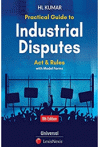- Author(s): Gaurav Kumar, H.L. Kumar
- Publisher: Universal LexisNexis
- Edition: 8 Ed Rp 2019
- ISBN 13 9789388548090
- Approx. Pages 576 + Contents
- Format Paperback
- Approx. Product Size 24 x 16 cms
- Delivery Time 3-5 working days (within Kerala & South India) (Others 7-9 days)
- Shipping Charge Extra (see Shopping Cart)
.............................................................................................................................
Description
Labour law is the art of economic order sustained by social justice. It aims at pragmatic success, but is guided by value-realities, lt believes in relativity and rejects absolutes. The constitutional amendment (Article 43A) which emphasizes the workers role in production as partners in the process, read in the light of the earlier accent on workers rights and social justice, gives a new status and sensitivity to industrial Jurisprudence in our "socialist republic" This social philosophy must inform interpretation and adjudication, a caveat needed because precedents become time-barred when "societal ethos" progresses. The golden rule in a rapidly changing system, "is that there are no golden rules". Courts should be guided by realistic judicial responses to "societal problems", against the back drop of the new, radical values implied in 'social justice to labour, the production backbone of the nation, adjusted to the environs of the particular industry and its economies and kindred circumstances. The dynamics of labour law, rather than the bonded labour of old-time case-law answers questions of current justice. But protection to labour does not mean ruining he management. Industrial Law endeavors to improve the service conditions of industrial labour so as to provide tor them the ordinary amenities of life, and by that process to bring about industrial peace which could in its turn accelerate productive activity of the county resulting in its prosperity. The prosperity to the country in its turn helps to improve the conditions of labour. By this process it is hoped that the standard of life of labour can be progressively raised from the stage ot minimum wage, passing through need found wage, fair wage, to living wage. The Industrial Disputes Act, 1947, was enacted to make provision for the investigation and settlement of industrial disputes and for certain other purposes, such as, to secure industrial peace There are many judgments on the definitions of various terms such as industry worker, industrial dispute, appropriate government, etc.
Containing
* Section-Wise Commentary based on nearly 1900 cases
* Rules Made under the Act with State Amendments
* Suggested Proformas
.............................................................................................................................
Contents
Chapter I - Preliminary
Chapter II - Authorities under this Act
Chapter IIA - Notice of Change
Chapter IIB - Grievance Redressal Machinery
Chapter III - Reference of Disputes to Boards, Courts or Tribunals
Chapter IV - Procedure, Powers and Duties of Authorities
Chapter V - Strikes and Lock-outs
Chapter VA - Lay-off and Retrenchment
Chapter VB - Special Provisions Relating to Lay-off, Retrenchment and
Closure in Certain Establishments
Chapter VC - Unfair Labour Practices
Chapter VI - Penalties
Chapter VII - Miscellaneous
The First Schedule
The Second Schedule
The Third Schedule
The Fourth Schedule
The Fifth Schedule
The Industrial Tribunal (Procedure) Rules, 1949
The Industrial Tribunal (Central Procedure) Rules, 1954
Industrial Disputes (Central) Rules, 1957
Preliminary
Part I - Procedure for Reference of Industrial Disputes to Boards of Conciliation,
Court of Enquiry, Labour Courts, Industrial Tribunals or National Tribunals
Part II - Arbitration Agreement
Part III - Power, Procedure and Duties of Conciliation Officers, Boards, Courts,
Labour Courts, Tribunals, National Tribunals and Arbitrators
Part IV - Remuneration of Chairman and Members of Courts Presiding Officers of
Labour Courts, Tribunals and National Tribunals, Assessors and Witnesses
Part V - Notice of Change
Part VI - Representation of Parties
Part VII - Works Committee
Part VIII - Miscellaneous
Suggested Pro-Formas
Subject Index
.............................................................................................................................
Author Details
H.L. Kumar, Advocate Supreme Court of India, Editor, Labour Law Reporter
Gaurav Kumar, MBA, LL.M., Advocate
.............................................................................................................................

